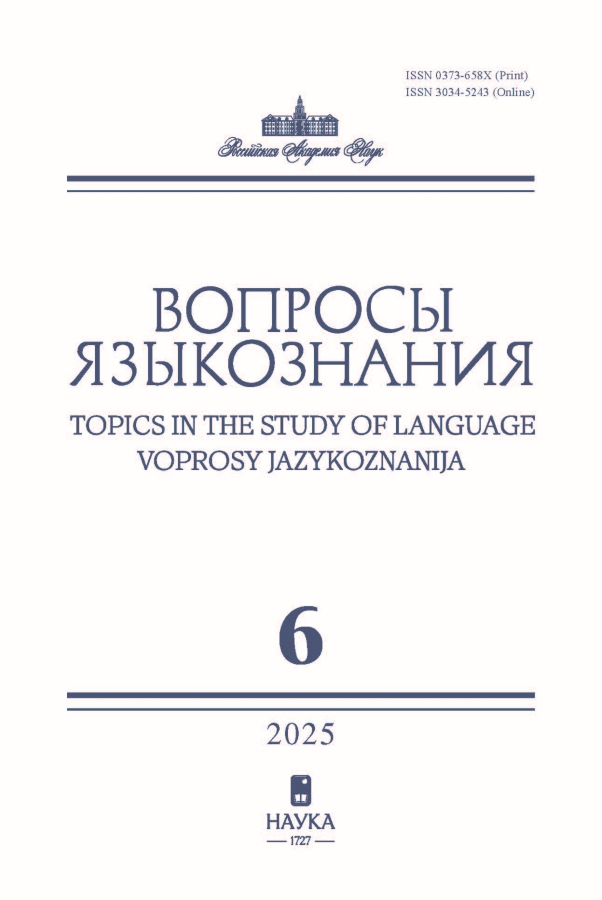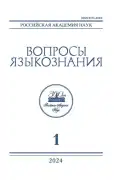Phrase prosody of a southern Russian dialect: Rogovatoe
- Authors: Knyazev S.V.1
-
Affiliations:
- Vinogradov Russian Language Institute, Russian Academy of Sciences
- Issue: No 1 (2024)
- Pages: 85-127
- Section: Articles
- URL: https://journals.eco-vector.com/0373-658X/article/view/650615
- DOI: https://doi.org/10.31857/0373-658X.2024.1.85-127
- ID: 650615
Cite item
Abstract
This paper deals with the phrase intonation of the Southern Russian dialect spoken in the village of Rogovatoe, in the Starooskol’sky district of the Belgorod region. The study is devoted to the analysis of the prosodic structure of various communicative categories: statements, yes-no questions, wh-questions, non-finality, imperative, and vocative. Based on the examination of more than 7000 sentences, I argue that the dialect of Rogovatoe uses only two monotonal pitch accents — H* and L* — as opposed to three bitonal accents of Modern Standard Russian. I also postulate two final boundary tones — H% and L% — for this dialect, while no proof of a phonological distinction between the high and the low phrase accents was found. Finally, the idiom of Rogovatoe employs the phonological distinction between the high and the low initial boundary tone — %H and %L. Therefore, the prosodic system of this Southern Russian dialect is much more focused on the level tones than Modern Standard Russian utilizing predominantly contour (rising and falling) tones.
Keywords
Full Text
About the authors
Sergey V. Knyazev
Vinogradov Russian Language Institute, Russian Academy of Sciences
Author for correspondence.
Email: svknia@gmail.com
Russian Federation, Moscow
References
- Брок 1916 — Брок О. Говоры к западу от Мосальска. Пг.: Тип. Императорской Академии наук, 1916. [Brok O. Govory k zapadu ot Mosal’ska [Dialects to the West of Mosal’sk]. Petrograd: Press of the Imperial Academy of Sciences, 1916.]
- Брызгунова 1963 — Брызгунова Е. А. Практическая фонетика и интонация русского языка. М.: Изд-во Московского ун-та, 1963. [Bryzgunova Е. А. Prakticheskaya fonetika i intonatsiya russkogo yazyka [Practical phonetics and intonation of Russian]. Moscow: Moscow Univ. Press, 1963.]
- Брызгунова 1980 — Брызгунова Е. А. Интонация. Русская грамматика. Т. 1: Фонетика, фонология. Ударение. Интонация. Словообразование. Морфология. Шведова Н. Ю. (ред.). М.: Наука, 1980, 103–118. [Bryzgunova E. A. Intonation. Russkaya grammatika. Vol. 1: Fonetika, fonologiya. Udarenie. Intonatsiya. Slovoobrazovanie. Morfologiya. Shvedova N. Yu. (ed.). Moscow: Nauka, 1980, 103–118.]
- Дурягин 2021 — Дурягин П. В. Интонация частного вопроса в русском языке: экспериментальное исследование источников вариативности. Русский язык в научном освещении, 2021, 1(41): 137–177. [Duryagin P. V. Russian wh-question intonation: Experimental data on some sources of variation. Russkij jazyk v nauchnom osveshchenii, 2021, 1(41): 137–177.]
- Дурягин 2022 — Дурягин П. В. Фонетическая реализация русских тональных акцентов в контекстах сопоставительного вопроса и перечисления. Вестник Санкт-Петербургского университета. Язык и литература, 2022, 19(1): 81–102. [Duryagin P. V. The phonetic realization of Russian pitch accents in contrastive questions and enumeration contexts. Vestnik Sankt-Peterburgskogo universiteta. Yazyk i literatura, 2022, 19(1): 81–102.]
- Игараши 2002 — Игараши Й. Так называемая «нейтрализация интонации» — фонологическое опи-сание русской интонации. Бюллетень Японской ассоциации русистов, 2002, 34: 15–21. [Igarashi Y. The so-called “intonation neutralization” — phonological description of Russian intonation. Byulleten’ Yaponskoi assotsiatsii rusistov, 2002, 34: 15–21.]
- Йокояма 2003 — Йокояма О. Нейтральная и ненейтральная интонация в русском языке: автосег-ментная интерпретация системы интонационных конструкций. Вопросы языкознания, 2003, 5: 99–122. [Yokoyama O. Neutral and non-neutral intonation in Russian: Autosegmental interpretation of the system of intonation constructions. Voprosy Jazykoznanija, 2003, 5: 99–122.]
- Касаткина 2002 — Касаткина Р. Ф. Заметки о южнорусской интонации. Материалы и исследования по русской диалектологии. Вып. I(VII). Касаткин Л. Л. (ред.). М.: Наука, 2002, 134–151. [Kasat-kina R. F. Notes on South-Russian intonation. Materialy i issledovaniya po russkoi dialektologii. No. I (VII). Kasatkin L. L. (ed.). Moscow: Nauka, 2002, 134–151.]
- Князев 2022а — Князев С. В. О структуре тонального акцента в русских говорах с «пословным» мелодическим оформлением. Русский язык в научном освещении, 2022, 1: 113–153. [Knyazev S. V. The structure of pitch accent in Russian dialects with “word-by-word” melodic contour. Russkij jazyk v nauchnom osveshchenii, 2022, 1: 113–153.]
- Князев 2023 — Князев С. В. Интонация юго-западного архангельского говора. Труды Института русского языка им. В.В. Виноградова РАН. 2023, 4: 175–195. [Knyazev S. V. Phrase intonation of a South-West Arkhangel’sk dialect. Trudy Instituta russkogo yazyka imeni V. V. Vinogradova, 2023, 4: 175–195.]
- Князев 2024 — Князев С. В. Русская диалектная просодия и интонационная фонология русского языка: восходящий акцент. Русский язык в научном освещении, 2024, 1 (в печати). [Knyazev S. V. Phrase prosody of Russian dialects and intonational phonology of Russian: Rising pitch accent. To appear in: Russkij jazyk v nauchnom osveshchenii, 2024, 1.]
- Князев, Дьяченко 2023a — Князев С. В., Дьяченко С. В. Интонация западного среднерусского окающего говора. Труды Института русского языка им. В. В. Виноградова, 2023, 4: 149–174. [Knyazev S. V., Dyachenko S. V. Phrase prosody of a Western Middle-Russian dialect with okan’je. Trudy Instituta russkogo yazyka imeni V. V. Vinogradova, 2023, 4: 149–174.]
- Князев, Дьяченко 2023б — Князев С. В., Дьяченко С. В. Мелодический контур общего вопроса в западном среднерусском акающем говоре. Ч. I. Селигеро-Торжковские говоры. Вестник Мос-ковского ун-та. Сер. 9. Филология. 2023, 1: 50–70. [Knyazev S. V., Dyachenko S. V. Melodic con-tour of yes-no question in a Western Middle-Russian dialect with akan’je. Part I: Seliger-Torzhok di-alect. Vestnik Moskovskogo universiteta. Ser. 9. Filologiya, 2023, 1: 50–70.]
- Князев, Дьяченко 2023в — Князев С. В., Дьяченко С. В. Мелодический контур общего вопроса в западном среднерусском акающем говоре. Ч. II. Псковские говоры. Вестник Московского ун-та. Сер. 9. Филология. 2023, 2: 44–60. [Knyazev S. V., Dyachenko S. V. Melodic contour of yes-no question in a Western Middle-Russian dialect with akan’je. Part II: Pskov dialect. Vestnik Mos-kovskogo universiteta. Ser. 9. Filologiya, 2023, 2: 44–60.]
- Князев, Дьяченко 2023г — Князев С. В., Дьяченко С. В. Мелодический контур общего вопроса в белозерских говорах. Исследования по славянской диалектологии. 2023, 24: 205–228. [Knyazev S. V., Dyachenko S. V. Melodic contour of yes-no question in Belozersk dialect. Issledovaniya po slavyanskoy dialektologii, 2023, 24: 205–228.]
- Кобозева, Захаров 2004 — Кобозева И. М., Захаров Л. М. Для чего нужен звучащий словарь дис-курсивных слов русского языка. Компьютерная лингвистика и интеллектуальные технологии: Труды международного семинара Диалог’2004. М.: Наука, 2004, 292–297. [Kobozeva I. M., Zakh-arov L. M. Why we need a dictionary of Russian discourse markers with recordings. Komp’yuternaya lingvistika i intellektual’nye tekhnologii: Trudy mezhdunarodnogo seminara “Dialog’2004”. Moscow: Nauka, 2004, 292–297.]
- Кодзасов 2009 — Кодзасов С. В. Исследования в области русской просодии. М.: Языки славянских культур, 2009. [Kodzasov S. V. Issledovaniya v oblasti russkoi prosodii [Studies in Russian prosody]. Moscow: Yazyki Slavyanskikh Kul’tur, 2009.]
- Пост 2007 — Пост М. К проблеме описания интонации общего вопроса в одном севернорусском говоре. Материалы докладов и сообщений V Международной конференции «Фонетика сегодня» (8–10 октября 2007 г.). Касаткина Р. Ф. (ред.). М.: ИРЯ РАН, 2007, 156–157. [Post M. Describing the intonation of the polar question in a Northern Russian dialect. Materialy dokladov i soobshchenii V Mezhdunarodnoi konferentsii «Fonetika segodnya». Kasatkina R. F. (ed.). Moscow: Vinogradov Russian Language Institute, 2007, 156–157.]
- Янко 2004 — Янко Т. Е. Русская интонация в задачах и примерах. Русский язык в научном освеще-нии, 2004, 2(8): 86–123. [Yanko Т. Е. Russian intonation in problems and examples. Russkij jazyk v nauchnom osveshchenii, 2004, 2(8): 86–123.]
- Янко 2008 — Янко Т. Е. Интонационные стратегии русской речи в сопоставительном аспекте. М.: Языки славянских культур, 2008. [Yanko T. E. Intonatsionnye strategii russkoi rechi v soposta-vitel’nom aspekte [Intonation strategies of Russian speech in a comparative aspect]. Moscow: Yazyki Slavyanskikh Kul’tur, 2008.]
- Arvaniti 2022 — Arvaniti A. The autosegmental metrical model of intonational phonology. Prosodic theory and practice. Shattuck-Hufnagel S., Barnes J. (eds.). Cambridge (MA): MIT Press, 2022, 25–83.
- Beckman, Pierrehumbert 1986 — Beckman M. E., Pierrehumbert J. Intonational structure in Japanese and English. Phonology Yearbook, 1986, 3: 15–70.
- Beckman et al. 2005 — Beckman M. E., Hirschberg J., Shattuck-Hufnagel S. The Original ToBI system and the evolution of the ToBI framework. Prosodic typology. The phonology of intonation and phras-ing. Jun S.-A. (ed.). Oxford: Oxford Univ. Press, 2005, 9−54.
- Igarashi 2005 — Igarashi Y. How many falling intonation patterns in Russian : categories of F0 align-ment. Programme & Book of Abstracts: Between Stress and Tone (Leiden, June 17–18, 2005). Leiden: Leiden Univ., 2005, 32–33.
- Igarashi 2006 — Igarashi Y. Intonational patterns in Russian interrogatives — phonetic analyses and phonological interpretations. Prosody and syntax: cross-linguistic perspectives. Kawaguchi Y., Fónagy I., Moriguchi T. (eds.). Amsterdam: John Benjamins, 2006, 175–196.
- Makarova 2003 — Makarova V. Intonation features in categorization of Russian sentence type. Investi-gations into Formal Slavic Linguistics. Contributions of the Fourth European Conference on Formal Description of Slavic Languages — FDSL IV. Held at Potsdam University, Nov. 28–30, 2001. Kosta P., Blaszczak J. (eds.). Potsdam: Potsdam Univ., 2003, 83–95.
- Makarova 2007 — Makarova V. The effect of pitch peak alignment on sentence type identification in Russian. Language and Speech, 2007, 50: 385–422.
- Meyer, Mleinek 2006 — Meyer R., Mleinek I. How prosody signals force and focus—a study of pitch accents in Russian yes–no questions. Journal of Pragmatics, 2006, 38(10): 1615–1635.
- Odé 1989 — Odé C. Russian intonation: A perceptual description. Amsterdam: Rodopi, 1989.
- Odé 2005 — Odé C. Neutralization or truncation The perception of two Russian pitch accents on ut-terance-final syllables. Speech Communication, 2005, 47(1–2): 71–79.
- Odé 2007 — Odé C. Communicative functions and prosodic labelling of three Russian pitch accents. Spine, 2007, 32: 377–401.
- Odé 2008 — Odé C. Transcription of Russian Intonation, ToRI, an interactive research tool and learning module on the Internet. Studies in Slavic and General Linguistics, 2008, 34: 431–449.
- Pierrehumbert 1980 — Pierrehumbert J. B. The phonology and phonetics of English intonation. Ph.D. diss. Cambridge (MA): Massachusetts Institute of Technology, 1980.
- Post 2005 — Post M. The Northern Russian pragmatic particle dak in the dialect of Varzuga (Kola Penin-sula). An information structuring device in informal spontaneous speech. Doctoral diss. Tromsø: Univ. of Tromsø, 2005.
- Post 2008 — Post M. Post-nuclear prominence patterns in Northern Russian question intonation. Proc. of the 4th Conf. on Speech Prosody (Campinas, May 6–9, 2008). Campinas: State Univ. of Campinas, 2008, 233–236.
- Rathcke 2006 — Rathcke T. Relevance of F0 peak shape and alignment for the perception of a function-al contrast in Russian. Proc. of the 3rd Conf. on Speech Prosody (Dresden, May 5–6, 2008). Hoffmann R., Mixdorff H. (eds.). Dresden: Dresden Univ. of Technology, 2006, 65–68.
- Rathcke 2017 — Rathcke T. How truncating are ‘truncating languages’ Evidence from Russian and German. Phonetica, 2017, 73: 194–228.
Supplementary files




































































































